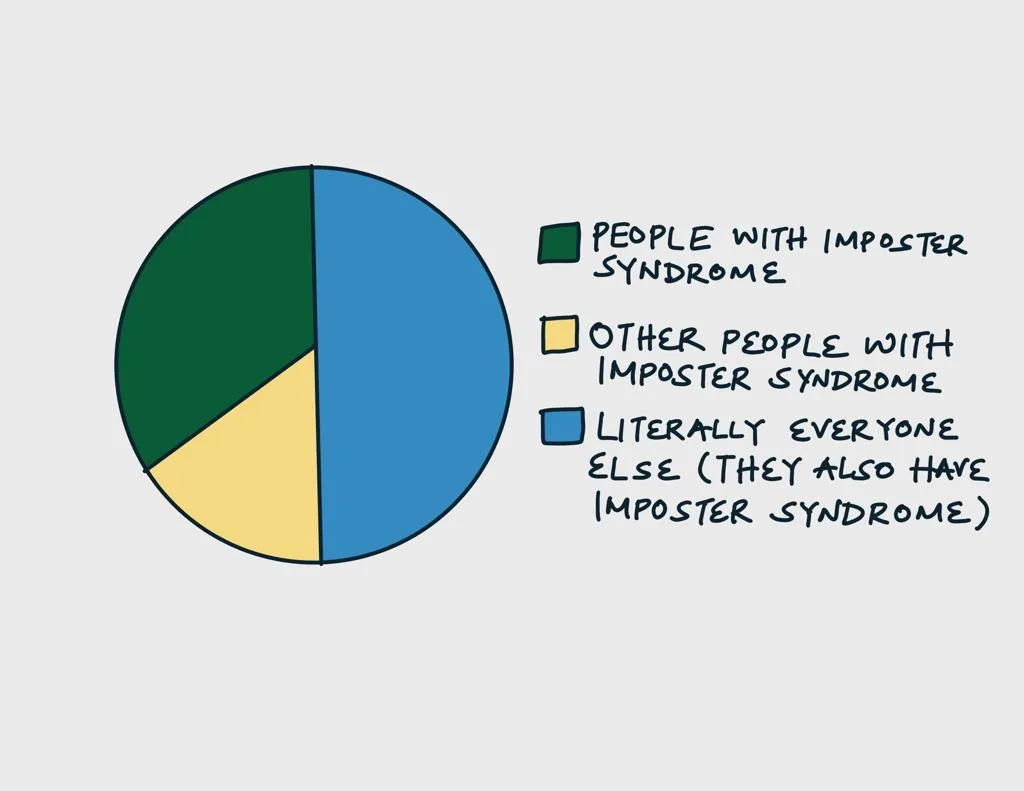“I got lucky”
“I only passed because the examiner liked me”
“Everyone else seems to understand this better than me”
“I will never be as good as them
“It was easy; anyone could have done it”
“I’m just pretending to be competent. I don’t know what I am doing”
“I should have known everything”
“They’re going to find out that I’m not as good as they think”
“I don’t belong here. I’m just fooling everyone.”
“I should have done everything perfectly.”
This is what imposter syndrome feels like. It is the feeling that you are undeserving despite all of your achievements. That success is only short-lived and sooner rather than later people will discover that you are a fraud. It’s a common yet distressing feeling that affects high-functioning and high-achieving people.

Imposter syndrome is an adaptive response to success. While a “normal” person might go out to celebrate their success after working, the imposter feels terrified that everything will come tumbling down and they compensate by working harder to meet these feelings of inadequacy. The advantage is that the hard work pays off and leads to more and more success. The disadvantage however is that with time this may lead to burnout, anxiety, guilt, and ultimately depression.
Imposter syndrome can be caused by pressure from parents to perform academically well. Maybe as a child, the imposter was “gifted” or the sibling of a golden child. They were used to their accomplishments being appreciated but had their efforts go unnoticed. Then they grow up thinking that everything should be easy for them because they are smart and talented. When they manage to do a good job but struggle in the process, they think “Why am I struggling? Isn’t this supposed to be easy”, and “If I am struggling this hard to pass the exam then something has to be wrong with me”.
Societal biases can also cause imposter syndrome. For example, gender biases such as having male-dominated fields and underrepresentation can lead to imposter syndrome in women. Lack of diversity in medical education and limited access to opportunities can lead to a sense of unfairness and make us feel like we have to work harder to overcome these barriers. Co-existing mental health illness, low self-esteem and the mounting pressure of new responsibilities can also lead to imposter syndrome.
So how can we tackle this? Trying to do more will only lead us into a vicious cycle. Since the more you accomplish the less competent you feel. Imposter syndrome is not a diagnosis. Getting help from therapy might yield varied results. You can try sharing your feelings of inadequacy with your friends or family.
As we have seen, imposter syndrome is brought about and reinforced by negative cognitive patterns. Let’s break down 4 main patterns and how we can challenge each of them.
Pattern 1: Not attributing success to your efforts
Example: “I passed because the lecturer likes me” and “It was easy, everyone could have done it”
Remedy: Think a little bit about why you were successful.
For example consider the hours you spent studying, understanding concepts, and applying them. Recognize that your success is a result of your hard work and dedication. Do not ignore the stuff you did right.
Pattern 2: Attributing others’ success to hard work
Example: “They succeeded through sheer hard work and dedication, unlike me” or “Everyone else seems to understand this better than me”
Remedy: Ask, “What advantages did they have?”
When a peer achieves success, rather than dismissing it as something they deserved, consider the advantages or resources they had. For instance, you might want to recognize that they got additional support. Or that they simply had prior experience.
Pattern 3: Emphasis on pleasing others and external validation
Example: “They’re going to find out that I am not as good as they think”
Remedy: Take pride in your accomplishments.
Instead of seeking constant validation from authority figures, focus on internal validation. Focus on personal growth rather than seeking constant external affirmation. And most importantly, do not compare your achievement with other people.
Pattern 4: Overemphasis on Perfectionism
Example: “If I make a mistake it proves that I am not good enough” or “I should have done everything perfectly”
Remedy: Embrace a growth mindset and normalize failure as a stepping stone towards growth
Understand that making mistakes is human and it does not diminish your capabilities. Take setbacks as opportunities to learn and improve. Instead of aiming for a flawless performance, focus on learning from your mistakes.




